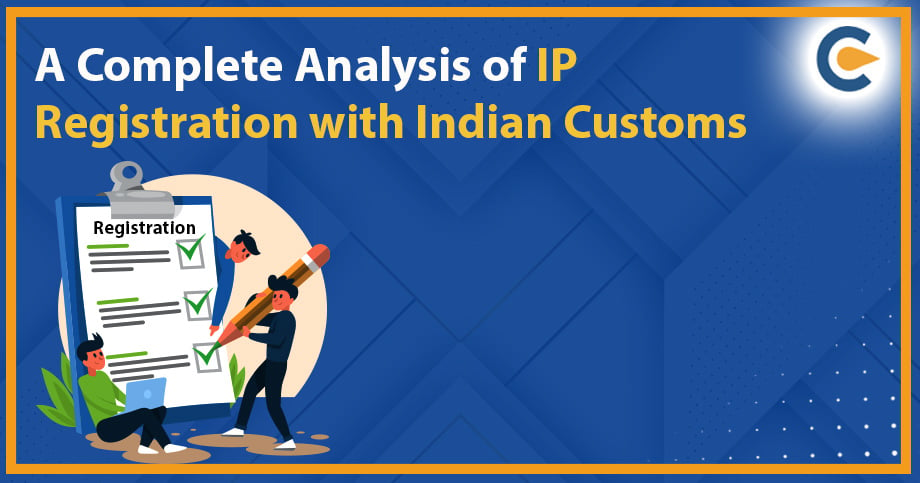Counterfeiting and infringement of intellectual property has for long been a growing menace not only in the domestic market but has risen exponentially in the global market as well. The presence of such counterfeit and infringing goods adversely affects the rights of intellectual property right holders and dampens the economy and the spirit of fair trade. To prevent cross-border counterfeiting and protect the rights of IP holders, the governments of various countries bring in the Customs of that particular nation to curb the menace. India, being a signatory to the World Trade Organization’s agreement on the treaty on Trade-Related aspects of Intellectual Property Rights (TRIPS), is required to put in place measures to curb cross-border counterfeiting and infringement of intellectual property rights. Scroll down to check IP Registration with Indian Customs.
To honour India’s commitment to TRIPS, the government of India notified the Intellectual Property Rights (Imported Goods) Enforcement Rules, 2007. IP Rights holders can record their IP rights like, inter alia, trademark, copyright, design, and geographical indication online on the Indian Customs IPR Recordation Portal. The Intellectual Property Rights (Imported Goods) Enforcement Rules, 2007 authorizes the Customs Authority to deal with counterfeit goods and puts an administrative duty on it to prevent the violation of IP owner’s right from the infringing goods. The Customs officials have the right to seize, detain and destroy the infringing goods. Under the IPR, 2007 Rules, infringing goods include “goods which are made, reproduced, put into circulation/otherwise used in the breach of intellectual property laws in India/outside India and without the consent of the right-holder or a person or individual duly authorized to do so by a rights holder”.
Type of Goods Prohibited under the IPR Rules, 2007
The import of the following goods is prohibited:
- Goods with false trademark as provided under Section 102 of the Trademark Act, 1999
- Goods with false trade description as provided under Section 2(1)(i) of the Trademark Act, 1999.
- Goods made beyond the limits of India and intended for sale on which a design in which copyright exists under the Design Act, 2000 is applied.
- Goods with false Geographical Indications as provided under Section 38 of the Geographical Indications of Goods Act, 1999.
- Goods which are prohibited from being imported based on issuance by the Registrar of Companies under Section 53 of the Copyrights Act, 1957[1]
Essential Documents Necessary for IP Registration with Indian Customs on IPR Recordation Portal
As mentioned above, there are certain documents which need to be uploaded online; copies of the same must be submitted at a Customs Office for IP Registration with Indian Customs on IPR Recordation Portal. The documents required for IP Registration with Indian Customs:
- Proof of ownership of IP Rights and copies of corresponding certificates of registration.
- For trademarks and designs, images of genuine goods
- Images of infringing goods, if applicable
- A statement as to the scope of IP rights sought to be recorded
- Statement as to grounds for suspension of infringing goods
- Details specifying distinguishing factors between infringing goods and genuine goods
- Customs Tariff headings of the applicable goods
- The Importer Exporter Code of the rights holder and other authorized persons
- Description of geographical indications and geographical area of production, if applicable
- an indemnity bond indemnifying the Customs authority against all liabilities, penalties, and expenses due to suspension of clearance of infringing goods
- a general or centralized bond executed by the IP rights holder to bear the cost of detention and destruction of infringing goods
- Demand draft of Rupees Two Thousand in favour of the Commissioner of Customs of the selected location.
- Power of attorney authorizing the person filing the application if the applicant is not the IP rights holder.
Procedure for IP Registration with Indian Customs on IPR Recordation Portal
Following is the procedure for IP Registration with Indian Customs on IPR Recordation:
- Register on the Indian Customs IPR Recordation Portal
A separate application must file separate applications for different IP rights like trademark, patent, design, copyright, and geographical indication on the Recordation portal. Once the applicant has registered on the portal, a unique user ID and password shall be generated.
- Fill in the application form with documents.
The application form must be duly filled along with attaching the requisite documents. This single application shall cover multiple ports.
- Submission of hard copies of uploaded documents to the Customs Office
After the applicant has filled in the application and has submitted the necessary documents online, a Unique Temporary Registration Number shall be generated. Once this Unique Temporary Registration Number has been generated, the applicant must send a copy of the online application form, hard copies of the documents which were submitted online along with the Unique Temporary Registration Number and the requisite statutory fee to the Customs Office’s IPR cell. The applicant may choose any Customs Office of her choice. This single application shall
- Confirmation of Recordation
After the Commissioner of Customs approves the application for recordation, the Unique Temporary Registration Number shall be converted into a Unique Permanent Registration Number, which, once issued, shall confirm the recordation.
Conclusion
The measures taken by the government of India to honour the commitment to TRIPS by notifying the Intellectual Property Rights (Imported Goods) Enforcement Rules, 2007 and putting in place mechanisms for IP recordation with the Customs office is a great initiative in curbing the menace of cross-border counterfeiting. IP Rights holders should record their rights with the Customs office and help the authorities fight cross-border counterfeiting and infringement of their IP Rights.
Read Our Article: Basics of intellectual property rights: Explained











